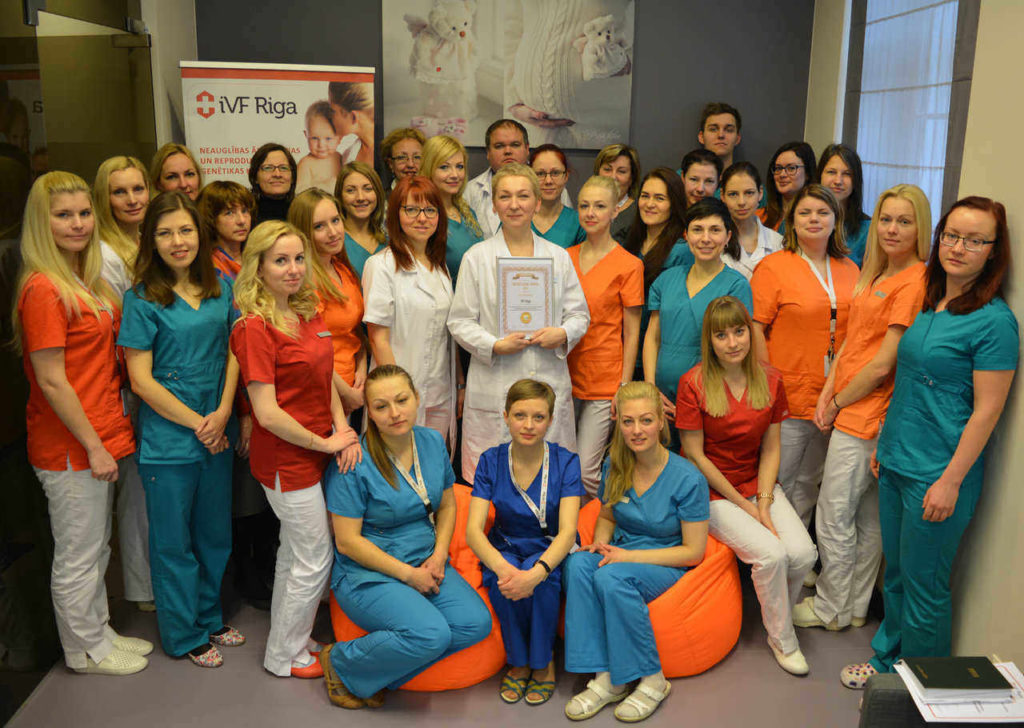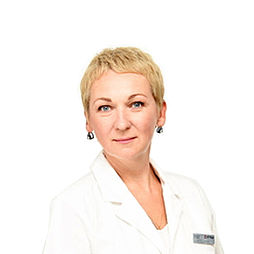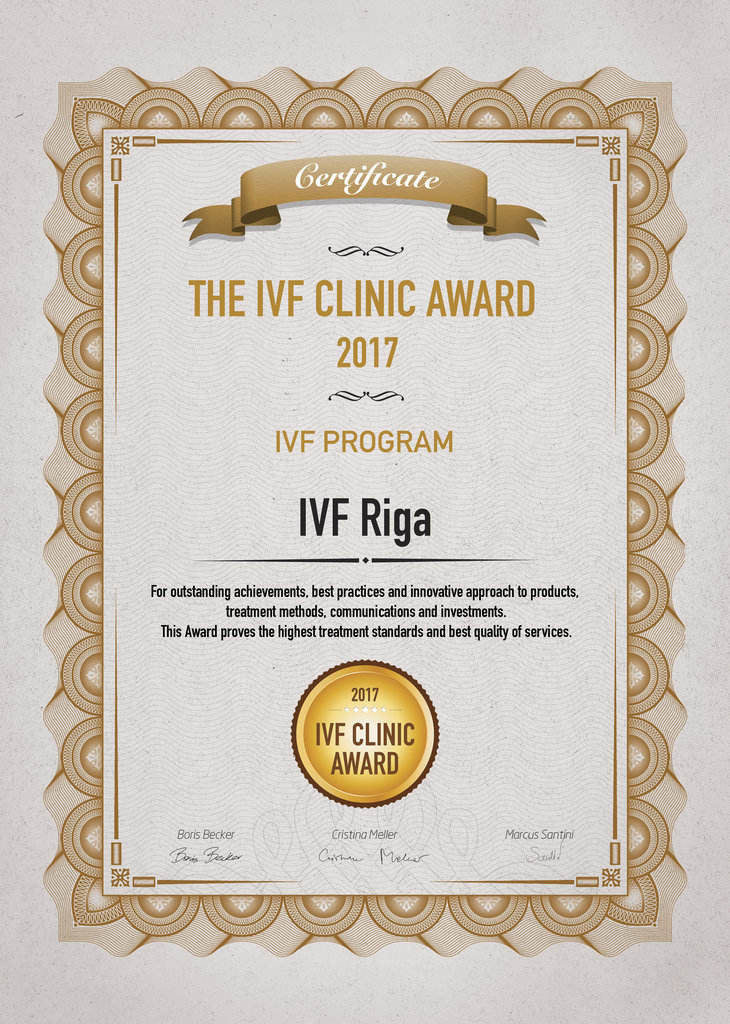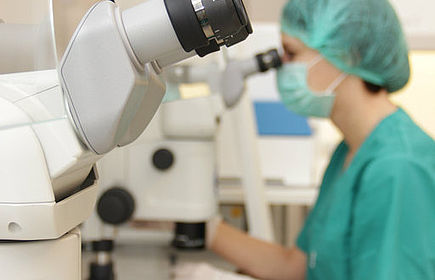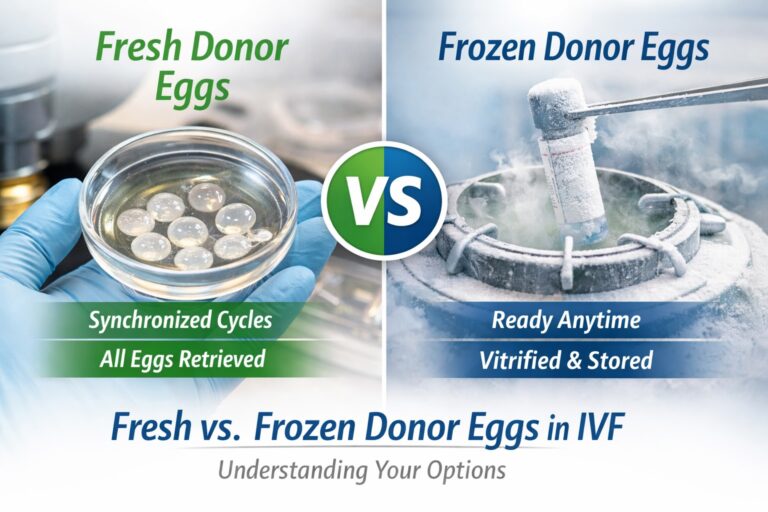iVF Riga is a fertility clinic located in Latvia. It was established in 2013 and employs 15 physicians, 3 embryologists and 12 patient coordinators. The clinic is a member of many prestigious organizations like ESHRE, BFS, Latvian Society of Gynaecologists and Latvian Society of Human Reproduction, holds two ISO certificates and is a winner of many awards, among many the IVF CLINIC AWARD 2014 and 2015. This year iVF Riga has again swept the competition and was awarded IVF CLINIC AWARD 2017 for best IVF Program.
Dr Violeta Fodina, iVF Riga’s Medical Director, shared with us her thoughts on the award and the clinic’s achievements.
- Dr Violeta Fodina, Medical Director, Reproductology Specialist, Gynaecologist, Obstetric Specialist
EggDonationFriends: You have previously received the IVF CLINIC AWARD in the category of best IVF Program two times, in 2014 and 2015. Why did you apply for IVF AWARD 2017?
iVF Riga: At iVF Riga Clinic, we are continuously trying to apply the newest achievements of modern reproduction medicine to ensure the best results for our patients. We also want to share our achievements with everyone interested in IVF possibilities, to let people know that there’s always hope. IVF CLINIC AWARD helps us to share those achievements with the world.
EDF: What does it mean to your team to be recognized for the best IVF Program award?
iVF Riga: This recognition is of great importance to us. It confirms once again that we are on the right track, it gives us the strength not to stop and keep moving forward. IVF treatment is the main business line of our clinic, and we are happy that our IVF program has been noticed and selected as the best at the highest international level.
EDF: What has changed in your clinic since last year?
iVF Riga: We constantly develop and improve our offer. Currently we combine 3 innovative centres of modern medicine: Infertility Clinic, Centre for Reproductive Genetics and Stem Cells Centre. The clinic’s fertility doctors go the extra mile to improve the treatment results for severe anamnesis patients. We believe that our know-how in both human reproduction and genetics opens up new treatment possibilities, helps to improve IVF cycle effectiveness, clinical pregnancy rates and minimize genetic pathology risks.
Breakthrough IVF technologies at iVF Riga
Medicine and science is always moving forward. Thanks to new assisted reproduction technologies fertility specialists and embryologists are now able to select best quality reproductive cells (both oocytes and sperm) in order to increase the chance of pregnancy and birth of a healthy baby.
For those women who wish to delay becoming mothers, ether for social or medical reasons (e.g. cancer), cryoconservation of biological material (egg vitrification/egg freezing) has been a true breakthrough. New technologies followed and now embryologists can study chromosomes and spot genetic abnormalities in embryos before they implant them.
Best IVF Program at iVF Riga
EggDonationFriends have chosen to award iVF Riga for the most innovative, versatile and transparent IVF Program for a few reasons. The clinic excels in an impressive number of innovative reproduction technologies that bring patients one step closer to becoming a parent. Here are some of the tests and procedures offered by the clinic in their program:
- Assisted Embryo Hatching – human oocyte and then embryo is protected by a protein shield, similar to shell. Just like a chick needs to hatch from an egg, the embryo has to hatch from the shell. Only then it will be able to attach itself to the uterine wall properly. For patients who appear to have problems with implantation, AEH can be one of the solutions. During the AEH procedure the embryologist micro-manipulates (“drills”) the shell so it is softer prior your transfer day.
- Blastocyst Culture – culturing embryos in the lab till they reach the blastocyst phase increases the chances for healthy pregnancy. By examining 5-day blastocysts embryologists are able to pick the healthiest of them for embryo transfer.
- Array Comparative Genomic Hybridization (aCGH) and PGS – patients can benefit from various types of pre-transfer embryo examination. They are very accurate methods of identifying chromosomal errors. Thanks to PGS the doctors hope to entirely eliminate failed IVF attempts and miscarriages in the upcoming years.
- Cult-Active – a technique of activating oocytes after they had been fertilized. It is highly beneficial for female patients with a small number of fertilized oocytes after ICSI. Such low number of fertilized cells means that they were immature and need to be activated. The activation process is possible thanks to protein coming from sperm. How does it work? In short, the fertilized oocytes are placed in calcium ionophore and are given calcium boost that activates them.
- EmbryoGen – this technology improves embryo development in the uterus. EmbryoGen’s contains signal molecules that are also present in the mother’s body. After fertilization the eggs/embryos are cultivated in EmbryoGen till day 3 blastocyst. The reports show that the signal molecules assist in cell communication between the mother’s tissue and the embryo. The embryo is then strengthened and protected and this allows successful implantation. Doctors recommend EmbryoGen for female patients over 35 with increased risk of miscarriage due to their immune response to the blastocyst as a foreign body.
Who is it for?
a) two or more failures to implant
b) two or more (biochemical) pregnancy losses
c) two or more miscarriages
d) other cases of unexplained infertility
- Embryo Glue – it is an innovative assisted reproduction solution – it does exactly what you think it does. Embryo Glue helps the embryo attach to the wall of the uterus. Embryologists use acids and carbohydrates that act as glue (binding agent) and help the embryo stick to the mother’s uterus.
- EmbryoScope – iVF Riga is the first and only clinic in the Eastern European countries and one of the few in Europe to use this advanced incubator to cultivate embryos. EmbryoScope offers the right temperature and environment to imitate the mother’s womb. What is more, your embabies can be monitored non-stop and their development can be captured on video. This helps embryologists spot any potential abnormalities in growth. This solution has helped improve IVF results by 20%.
- ERA Test (endometrial receptivity array) – if you have had at least three failed transfers, ERA test is something you should consider having. Have you ever heard of the term “implantation window”? ERA is a diagnostic tool that helps pinpoint the moment when your endometrium is either receptive or non-receptive. Thanks to ERA doctors can schedule your transfer day more accurately. The test is performed through endometrium biopsy during your cycle.
- PICSI (Detailed Sperm Selection Technique) – is an improved version of ICSI technique. In PICSI embryologists are able to choose sperm cells with the highest motility and without any noticeable genetic defects and then inject it into the oocyte. This technique relies on placing sperm in hyaluronic acid as the acid only attaches to fully mature sperm cells. With PICSI embryologists can select better sperm. This mean higher pregnancy success rates and much higher chances of a take-home baby.
EggDonationFriends believe that iVF Riga truly deserves the IVF CLINIC AWARD 2017 for IVF Program – such variety of additional diagnostic tools and procedures help significantly increase the chances for successful pregnancy and live birth especially for female patients over the age of 35 or with multiple IVF failures. If you are interested in any of the procedures described and want to book no obligation consultation, check iVF Riga clinic profile or the clinic’s egg donation package.

